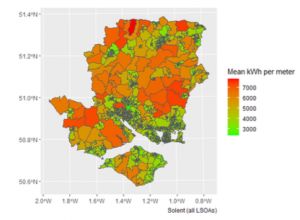Investigator: Dr Ben Anderson
Masters student: Meghan Kingsley-Walsh

LSOA level residential electricity demand in 2019 for the ‘wider Hampshire’ region
Hampshire County Council declared a Climate Emergency in June 2019 and have since set two targets for the County as a whole:
- To be carbon neutral by 2050
- To be resilient to the impacts of a 2oC temperature rise
It is becoming widely recognised that decarbonising national and local energy systems will be crucial to the successful achievement of targets such as these at both the national and local levels. In response this project will establish:
- The current purpose, pattern and scale of energy use within the area;
- The extent to which underlying local environmental, social and economic trends have affected these patterns over time;
- The current and future policy themes and settings which are likely to affect these trends.
Based on this work, we will then develop a gap analysis as a basis for a future-looking energy strategy for the County. This gap analysis will seek to understand where the opportunities might be for local action.
Given the interconnected nature of the local energy eco-system and the relative arbitrariness of administrative boundaries, the wider Hampshire area is taken to include the County, the Isle of Wight and the cities of Southampton and Portsmouth.
Latest project updates:
Early Hampshire Energy Mapping project results presented 09-2021 
Masters student Meghan Kingsley Walsh recently presented preliminary results from her Hampshire Energy Mapping dissertation project to Hampshire County Council’s Climate Change Expert Consultative Forum. Meghan’s presentation focused on the geo-spatial distribution of energy use and it’s relationship to fuel poverty, deprivation and area level age profiles.
